Every day, more than 100,000 flights roam around the global air space, carrying nearly 12 million passengers and about US$18 billion worth of goods in aircraft belly.
But that’s history now and no one knows when the global aviation industry will return to normal although some countries have resumed flights despite the Coronavirus pandemic.
It was just in March of 2020 when the lethal invisible Covid-19 virus struck yet its impact will be felt for many years to come and it will go down in history as one of the worsts with deaths of nearly 700,000 and worldwide infections rising to over 18 million with still no vaccine found.
The months of forced lockdowns worldwide to prevent the spread of the virus inevitably resulted to loss of business activities and jobs. It forced many companies to shut down operations, including the aviation industry which prompted airlines to ground their fleets of planes amid the global travel ban.
The Coronavirus pandemic crisis continues to keep everyone on edge but the onus of delivering essential services to sustain people, businesses and economies despite the situation, is greater on certain industries like healthcare, air cargo, logistics, among others.
Resilient & flexible
The air cargo industry has proven once more its flexibility and resiliency in times of disaster and extraordinary circumstances to support the world’s need for essential supplies.
Wilson Kwong, Chief Executive of the Hong Kong Air Cargo Terminal Limited (HACTL), one of the world’s largest and busiest cargo terminals which also owns and operates SuperTerminal1, the single largest multilevel air cargo terminal in the world, told Air Cargo Update in an exclusive interview the pandemic has changed the dynamics of the industry and that the new normal presents both challenges and opportunities.
At the height of the pandemic, the air cargo industry kept the global supply chains functioning, delivering much-needed medical supplies and equipment as well as other essential goods. Cargo carriers kept their freighter operations while airlines helped by having their passenger aircraft converted to freighters to meet the growing demand for essentials in the fight against the virus.
Hactl immediately adopted precautionary measures to protect its staff while performing their duties more than the usual with the demand for medical supplies all over the world heightened.
“The impact of the pandemic has shown itself both in how we work, and for whom we work. We took very early action to protect our staff and visitors to our terminal, and also to help ensure business continuity,” Kwong shared.
“Our many measures included temperature scanning of all arriving personnel, moving as many staff as possible to homeworking, rearranging shift patterns to minimize the number of people on the premises at any one time, issuing masks and sanitizer to all staff, distancing arrangements in our large catering facilities, and a ban on business meetings and business travel.
“Thankfully we have had no cases of COVID-19 among our staff at the time of writing, but we are not complacent and are retaining and constantly reviewing our protective measures.”
Hactl is capable of handling 3.5 million tons of cargo every year and more than 1 million data transactions on a daily basis yet its capacity and capabilities were put to the test during the height of the pandemic with the extraordinary movement of freights.
“The pandemic has also changed the profile of our business. At its peak, 95% of the global passenger fleet was grounded, and that lost cargo capacity had to be replaced. The result was significant growth in freighter movements and, as Hactl and Hong Kong are noted for their proficiency and capabilities in handling cargo aircraft, we received a lot of those flights,” said Kwong.
“Although the needle is gradually moving back towards the passenger belly, freighters are uplifting a bigger share of global air cargo than they have done in the past,” he continued.
‘More like a family than a business’
Founded in 1971, Hactl began its air cargo logistics operations at the Kai Tak International Airport in Kowloon Peninsula in 1976, becoming the only air cargo terminal operator in Hong Kong.
In 1998, Hactl moved to SuperTerminal1 which it built at Hong Kong International Airport with an investment of $1 billion. A significant number of its employees have been with the company for many years, some even for decades, mainly because they are treated with fairness and enjoy good fringe benefits.
“Hactl is more like a family than a business. Our workforce is very stable and dedicated, and we have many long-service employees; and our staff know we care very much about them,” said Kwong.
“When everyone saw how this global crisis was developing, and the key role we needed to play in getting PPE and other urgent supplies to destinations around the world, there was not a single moment’s hesitation on the part of anyone – they just got on and got the job done. I can’t tell you how proud I am of them; the patience, determination and sheer hard work which our team put in over the past few months have left me in awe,” he added.
As of press time, not a single staff of Hactl got infected with COVID-19. The company’s health protocols remain in strict implementation.
Kwong said apart from the staff’s dedication, it helped that Hactl invested so much in technology and automation to speed up the process of handling cargo in large volumes.
“The high degree of automation within our SuperTerminal1 facility, and our plentiful space and capacity meant that we were able to cope with the influx of freighter aircraft and the frequent spikes in demand. And as we have our own integrated ramp handling operation, this made adapting to sudden changes in traffic patterns and demand a much simpler matter,” he said.
Kwong believes the volatile situation is likely to continue and the important thing is for the industry to quickly adopt and deliver its tasks.
“We believe there is too much concentration on whether tonnages and flights are up or down, as if this is something over which any of us has any influence. The truth is, there are many factors at play which are totally beyond the industry’s control, and that’s going to continue for some time,” he said.
“What matters most right now is our ability to move whatever cargo is presented to us, and we are doing that despite all the challenges. We are all in this together and we need as much of our sector as possible to survive – or we will emerge with a weakened global industry that will negatively impact us all.”
A new era
The pandemic has ushered in a new era that requires combining creativity and innovation in different fronts and industries to survive the harsh realities.
According to the International Air Transport Association (IATA), the global passenger traffic will not return to pre-COVID-19 levels until 2024.
This year, global passenger numbers are projected to decline by 55% compared to 2019 despite easing up travel restrictions. That meant billions of losses for the aviation industry and lesser belly-hold capacity for the air cargo for the long-haul.
“Aviation faces a new reality in which passenger numbers are likely to remain depressed for a long time to come. Cargo has meanwhile carried on providing revenue opportunities for airlines when there were no others. It doesn’t take a genius to predict that cargo is going to receive a lot more attention in the future,” said Kwong.
This new reality could force many airlines to continue utilizing passenger planes for cargo to survive.
“This could manifest itself in a move to re-introduce the quick-change aircraft concept, it could lead to more P2F conversions using redundant passenger airframes, and it could result in growth in the freighter wet-leasing sector. What’s clear is that cargo demand has survived better than passenger demand, rates are stronger at present and likely to remain so, and that this spells opportunity,” explained Kwong.
Technology will drive the future
Our day-to-day lives have been completely changed with the evolution of technology from the time computers were invented, the internet, to the smart mobile phones. It has made the world smaller with connectivity made simpler and faster, giving us unparalleled access to people and businesses anywhere in the world.
We’re now in the era of the Fourth Industrial Revolution, or Industry 4.0, which takes digital technology to a whole new level of making interconnectivity stronger through the power of the Internet of Things (IoT), artificial intelligence (AI), big data, analytics, new cyber-physical systems and access to real-time data. These things will completely change how services are done and customer experiences different from bygone eras.
Hactl has long recognized the power of technology to speed up the process in cargo and logistics. Its own business model is focused on automation and sophisticated IT capabilities, both proved very resilient during the pandemic.
And Kwong said the company will continue to invest on technology to further enhance its capacities and capabilities.
“We continue to drive ever greater efficiency in our business daily, led by our Performance Enhancement unit, which proactively seeks out and destroys all inefficiencies. Some of its ideas may seem trivial and unexciting to outsiders – like our new system for inspecting our ETV system power rails and automatically reporting potential faults – but they add up to better business continuity, cost savings and even a reduced carbon footprint,” said Kwong.
“Apart from the possible future deployment of driverless vehicles and GSE (which is an ongoing project), we are probably now beyond any massive new developments – nowadays, it’s more about finessing what we already do well,” he added.
And while political instability continues to besiege Hong Kong with China asserting its power over the former British colony which was handed over to it in 1997 under the one country, two systems agreement, Kwong is convinced Hactl will continue to grow and even Hong Kong for that matter.
“Business has been challenging in 2020, and that will continue for some time to come. But we remain optimistic and confident in the future for Hong Kong and for Hactl. As an airport, we offer an unparalleled combination of strategic location, destinations, frequencies, main-deck capacity, large-scale freighter handling capabilities, modern Customs regime, bilingual workforce and legendary efficiency and work ethos,” said Kwong.
“It’s no accident that Hong Kong has been the world’s top international cargo hub for 10 years, and I don’t see that changing.”
Wilson Kwong: The conscientious leader
Wilson Kwong became the Chief Executive of Hactl in March 2018. Prior to joining the company, he was the Chief Executive of Jardine Engineering Corporation.
He began his career with Jardine Matheson Group in 1998 with Jardine Aviation Services before moving to the head office to work as Executive Assistant to the Group Managing Director. Following this, he held senior management positions in real estate development, property management and engineering services.
Passionate in serving his community, Wilson also holds key positions in various organizations—Vice Chairman of the Employers’ Federations of Hong Kong, Vice Chairman of the Environment and Sustainability Committee under the Hong Kong General Chamber of Commerce, and was a Director of the Business Environment Council.
He is also active in Advisory/Statutory Boards & Committees for the HKSAR Government. He is a Member of the Energy Advisory Committee, a member of the Advisory Committee on Agriculture and Fisheries, a Co-opted Member of the Hospital Governing Committee of Queen Mary Hospital and Tsan Yuk Hospital, and a Council Member of the Hong Kong International Arbitration Centre.
A graduate of the London School of Business and Political Science, Wilson also has two Master’s Degrees—business administration and real estate. He also holds a degree in law from the Chinese University of Hong Kong.
Read on some of his industry insights on this unprecedented time in our lifetime.
The logistics industry’s significance has become more visible in this era of pandemic and e-Commerce. How do you see it evolving as a vital component in sustaining global trade? What about its challenges?
Kwong: Logistics as a whole has learned some valuable lessons from the pandemic, and has already begun to change and adapt. Companies globally are developing new ways of working with distributed workforces. And industry is building in new supply chain resilience by diversifying its suppliers.
I think our industry and our markets are also learning that the days of rock-bottom rates—both ocean and air—are over, if we are to have an industry that can respond quickly and effectively to any future crisis. This has been a necessary re-set: the logistics industry could not have continued as it was for much longer.
Air cargo will remain the elasticity in supply chains, rather than greatly growing its share of global trade. As such, it will continue to command a premium. And, now that the man in the street has seen the air cargo industry’s heroes at work on his own TV screen, helping to save lives by keeping vital supplies moving, I think logistics will enjoy a new respect and be more valued in the future.
Please share some lessons we could all learn from this pandemic crisis.
Kwong: Information Technology really is the key to future resilience for this industry. We must accept the painful idea that COVID-19 may not be a one-off event, and so we need to ensure that our industry can continue to perform while staff levels are depleted, and while workers must work remotely. The better we become at passing information without paper or contact, the less we will be impacted by any future crisis.
It’s a safety issue, too. There is nothing more precious than human life, and good health. As well as being the right thing to do, it makes sound business sense to look after your workers, so they can take care of your business. That’s why Hactl will retain all its protective measures until any threat is totally removed.
And, as I said before, we need to take air cargo more seriously as a function of the aviation sector: aircraft fleets need to be more flexible, airports need better infrastructure for cargo, and we need to value our product more highly. Imagine what a COVID-19 world would have been like without the air cargo industry.
Swiss WorldCargo, the airfreight division of Swiss International Air Lines (SWISS), offers a comprehensive range of logistics solutions for transporting high-value and care-intensive consignments to more than 130 destinations in over 80 countries. Headquartered at Zurich Airport, Swiss WorldCargo has been widely touted as a reliable and innovative service provider within the Lufthansa Group. Founded in 2002, Swiss International Air Lines created its airfreight division Swiss WorldCargo the same year.
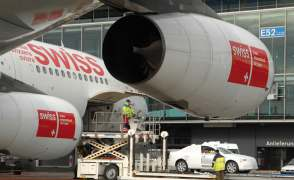 The Zurich-based airline appointed Mr. Ashwin Bhat as its head of cargo division in October 2015. A veteran in the air cargo industry, Mr. Bhat, an Indian national had joined the Swiss in 1999. Ever since, he had donned several roles within the company, including being the head of Area Management for Asia, Middle East and Africa in 2010.
The Zurich-based airline appointed Mr. Ashwin Bhat as its head of cargo division in October 2015. A veteran in the air cargo industry, Mr. Bhat, an Indian national had joined the Swiss in 1999. Ever since, he had donned several roles within the company, including being the head of Area Management for Asia, Middle East and Africa in 2010.
We spoke to Ashwin Bhat on an array of topics. Excerpts from an interview:
Which are the main regions and countries you provide freighter services to? Are you looking to foray into newer regions in the near future?
Swiss WorldCargo does not provide full freighter services; as the air cargo division of Swiss International Air Lines, our focus is to market the belly hold capacity of the SWISS fleet. The freight segment is very important to SWISS; in fact, it is only the co-loaded cargo that makes the operation of wide body aircraft really profitable.
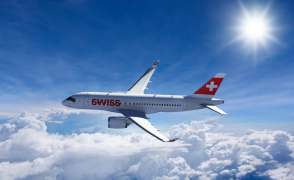 We offer a comprehensive range of logistics solutions for transporting high-value and care-intensive consignments to
We offer a comprehensive range of logistics solutions for transporting high-value and care-intensive consignments to
some 130 destinations in over 80 countries. Our extensive network of air cargo services is supplemented by daily truck connections between key business centres.
Swiss WorldCargo recently took delivery of the first of its nine new Boeing 777-300ER aircraft. How will this provide improved airfreight services and enhanced environmental performance on the long-haul operations. When do you expect delivery of the remaining aircraft?
The new long-haul twinjet will enable us to offer more of our high quality quality airfreight services between Zurich hub and destinations such as New York JFK, Hong Kong, Montreal, Los Angeles, Bangkok, São Paulo, San Francisco and Tel Aviv (see deployment plan below).
The routes on which we are first deploying the Boeing 777-300ER have a very high load factor, so we are increasing the freight capacity of a fully-occupied passenger flight to almost 24 t (+15%). But weight is not the only key factor in airfreight operations, so we have also placed particular emphasis on the configuration of the cargo hold.
Compartments 1 and 2 are temperature-controlled – which makes the B777 precisely the aircraft we want.
The youngest – and biggest – member of the SWISS fleet won’t just extend our service offer to our customers: it will
also enhance the environmental performance of our longhaul operations, as it produces substantially lower carbon
emissions and is impressively low-noise.
 The first of the nine aircraft which will be deployed in the SWISS fleet in 2016-17 was delivered at Zurich on 29th
The first of the nine aircraft which will be deployed in the SWISS fleet in 2016-17 was delivered at Zurich on 29th
January; the first intercontinental cargo operations took place on 21 January on flight LX14 from Zurich to New York JFK.
The B77W at a glance
– 9 new Boeing 777-300ER aircraft in the SWISS fleet
– 6 more in 2016, 3 more in 2017/2018
– A bigger belly hold: 24,5t of cargo capacity
– A wider range: 14,490 km with maximum payload
– More respect for the environment: Reduced CO2 emissions and noise
Swiss WorldCargo has just taken the lead in IATA’s e-AWB 360 campaign to speed up process implementation
of switching to electronic air waybills (e-AWB) to all destinations and customers at numerous airports using
the ‘single process’ concept. Elaborate on the same.
Swiss WorldCargo is fully committed to making the e-AWB a success. And this commitment is underlined by our
participation in the e-AWB 360 campaign. As envisaged under the campaign promoted by IATA to accelerate process
implementation, the new e-AWB, using the ‘Single Process’ approach is offered to all destinations and to all customers at a number of airports Amsterdam Schiphol (AMS) became the first such ‘e-airport’ on 1 January, joined by Paris (CDG) on 1 February, and by Zurich (ZRH), Dubai (DXB), Singapore (SIN), London (LHR) and Milan
(MXP and SWK) on 1 March. Additional key airports will follow in subsequent months.
At Swiss WorldCargo we have a holistic approach when it comes to paperless cargo and we work extensively with
regulators, freight forwarders, ground handling agents and other key stakeholders worldwide to achieve a paperless and more secure supply chain: In Zurich, for instance, we were the first airline to adopt the eCSD ‘Electronic Consignment Security Declarations’ which complements the paperless acceptance of air cargo.
Do you operate On Board Courier (OBC) services?
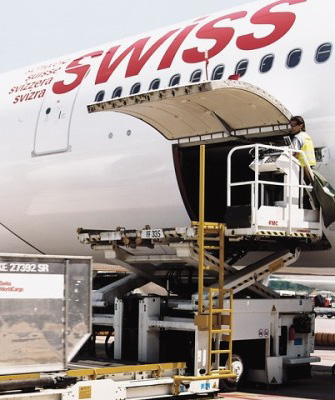 Since 2014, we have been offering an OBC service in cooperation with global on board courier specialist Chapman Freeborn.
Since 2014, we have been offering an OBC service in cooperation with global on board courier specialist Chapman Freeborn.
Elaborate on the understanding Swiss WorldCargo shares with Lufthansa Group in terms of providing quality airfreight services to its customers As an integral part of Swiss International Airlines and thereby the LH group, we have a very collaborative relationship with other group companies. Each of us brings our unique vision, strategy and strength, which we use to learn and benchmark in order to continuously improve our services to our customers.
As a European carrier, how much of competition do you face from the Gulf region carriers?
As with others in this industry, we face our share of competition from carriers from different regions in the
world, not just the Gulf carriers.
What are the company’s growth strategies for the coming years?
As stated earlier, 2016 and 2017 will see a growth in the range of 10 to 15% due to integration of 777 a/c’s into
our fleet. In addition to the capacity growth, we are also working on further enhancing our service and product
portfolio. Even in a sluggish market environment, there are segments which show growth and where we believe Swiss WorldCargo capabilities and offering will be appreciated e.g. pharma and life science segment.
Airfreight is a people’s business and one of the factors where we will continue differentiating to its competition is
through the people aspect. Swiss WorldCargo has defined that one of our key strategic success factors is going to
be the people; we will be investing in further developing the skills and knowledge of our teams in order to further
improve our engagement with our customers.
How will you rate Swiss WorldCargo’s achievements ever since you took over on October 1, 2015. Any new product innovations introduced worth mentioning?
It would not be appropriate to judge one owns performance and achievements; hence I would let our customers and staff judge and issue my report card.
Regarding product innovation as stated earlier, a number of plans, which we would communicate in the months
ahead.
What are your future projections for the air cargo industry?
2016 is continuing where 2015 ended. The uncertainty and sluggish market conditions will continue where capacity
will outgrow demand.
Sharjah International Airport is all set to receive 200 additional flights weekly this summer and has embarked on a large scale expansion project to continue offering excellent service to airlines and passengers
Sharjah is located between the city of Dubai and other Northern Emirates and known to be a thriving city, which is famous for its culture, heritage and numerous other tourist attractions. The emirate is also renowned to be a business hub which attracts entrepreneurs with its conducive atmosphere to business.
Sharjah International Airport’s history goes back to 1932, when it was known to be a stopover point by Imperial Airways – the forerunner of British Airways, which constructed an airfield at Sharjah as a stopover en-route to India and Australia.
Today, the airport is the Middle East region’s leading air transportation gateway and is considered to be a leading cargo hub in the region. In 2012, the airport added eight new cargo airlines to further enhance its position as one of the best cargo handling facilities and services in the region. Sharjah follows an ‘Open Sky Policy’ which permits airlines’ traffic rights without any hindrance.
Expansion project ongoing
To cope with air traffic increase, Sharjah International Airport has embarked on a four-fold expansion project; both air side and land side to ensure the excellence of quality service provided to airlines and passengers using the airport.
Expecting to see 25 million passengers by 2025, the airport is set to operate a new capacious runway alongside the old one by September this year. The project consists of the main runway spanning 4,060 meters and a width of 60 meters, has two taxiways and 10 connecting corridors which are intended to secure the aircraft out of the main runway in the shortest time to the hangar.
A senior official said the new airstrip will suffice the future needs of the third-biggest airport in the United Arab Emirates, particularly for large and new generation code-F aircraft such as A380, apart from the expected 14 million passengers in 2017 and the already one million tons of shipment capacity.
The airport has further contracted with construction company Bechtel to do a thorough development plan for the airport. The project also includes the implementation of a 15-km service road and the construction of a security fence extending 10 km as well as implementation of the rain water drainage network.
“The eight-month plan, to be ready this September, will identify the expansion trends of infrastructure projects in the airport and surrounding northern or southern areas,” said Ali Salim Al Midfa, Chairman of Sharjah International Airport.
Sharjah International Airport has reported 8 per cent increase in passenger traffic in the first quarter of this year. The passenger statistics showed that 2.25 million passengers used the airport from January to March 2014, growing from 2.08 million during the same period a year ago. In addition, aircraft movements increased to 16,373 while 51,045 and cargo activity handling rose to 51,045 tonnes.
There are leading airlines which operate flights from the Sharjah International Airport including Air Arabia, Air Blue, Air India, Air India Express, Cebu Pacific Air, Egyptair, Jet Airways, PIA, Qatar Airways and Srilankan Airlines and many others.
Besides, international cargo flights are also operated from Sharjah International Airport. Among these, Air Arabia is the main airline which flies to more than 90 airports throughout the world.
Sharjah International Airport believes its 2030 Master Plan will be able to attract new airlines. According to a top official, Sharjah International Airport is waiting to complete its 2030 Master Plan, which will include a logistics area connected to the planned Etihad Rail network.
Much of Sharjah’s growth over the past decade has been fuelled by Air Arabia that added eight new destinations this year. Sharjah International Airport handled 7.5 million passengers in 2012, a 13.6 per cent year-on-year jump from the previous year. In an effort to maintain these performance levels, Sharjah International Airport officials recently held discussions with the Ministry of Interior to develop facilities that will streamline passenger flows in and out of the airport.
The airport has become the preferred travel option of many because of the efficiency of procedures, excellent services and its strategic location.
The airport has also announced that it will see an influx of 200 additional weekly flights as airlines commence their summer schedule. The increase in weekly flights will come from a mixture of commercial and cargo operations including Srilankan Airlines, Qatar Airways and Saudia Cargo.
Furthermore, as Dubai International Airport’s runways are under renovation from 1 May until 20 July for 80 days, some of the flights have been diverted to Sharjah International Airport. This temporary move is expected to put additional pressure on the airport’s load. Among the airlines that have diverted their flights are Air India, Air India Express, Pakistan International Airlines (PIA) and Cebu Air Pacific.
“Sharjah International Airport is gearing up to meet with this new demand, both with regards to resource and infrastructure. Recently, the airport appointed 100 passport control officers, and opened 20 additional check-in counters to ease the travel and immigration formalities, as well as providing additional temporary gates to ensure the smooth and fast completion of the procedures,” added Mr. Al Midfa.
Sharjah Airport Authority (SAA) signed an agreement with Gama Aviation, the global aviation services company, permitting the company to manage private/business aviation services at Sharjah International Airport, including all procedures and processes, starting from issuing landing permissions to the handling of passengers and crews.
The agreement between SAA and Gama Aviation was signed by Ali Salim Al Midfa, Chairman of Sharjah Airport Authority and Richard Lineveldt, General Manager MENA for Gama Aviation respectively, in the presence of Shaikh Khalid Bin Essam Al Qasimi, Chairman, Department of Civil Aviation, Emirate of Sharjah.
Gama Aviation took over the responsibility for handling all business travellers at Sharjah International Airport in early 2012, but the company has been present in Sharjah as a charter operator since 2006.
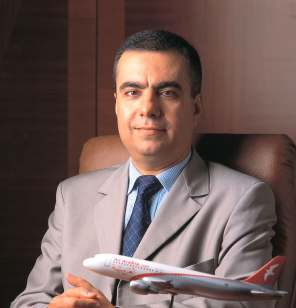 Leading low cost carrier – Air Arabia
Leading low cost carrier – Air Arabia
The government of Sharjah launched its own airline, Air Arabia, on October 28, 2003, which is a low-cost airline operating to 91 destinations in the Middle East, North Africa, the Indian subcontinent, Europe and Central Asia. The first flight was from Sharjah International Airport to Bahrain International Airport. Despite the tough competition in airline business, the airline is profitable from the first day of its commencement. As expected, the resultant increase in passenger throughput via Sharjah International Airport has been dramatic.
Air Arabia does not only transport passengers, but also offers cargo delivery services. The carrier operates cargo services to more than 50 destinations, which continuously grow.
Air Arabia deals with corporate customers in the region and worldwide such as Aramex, Emirates Post, UPS, FedEx and DHL. Furthermore, it is in bid to deliver cargo across a wider network, Air Arabia has expanded its cargo reach in collaboration with major freight carriers as interline partners such as Lufthansa, Cargolux, Singapore Airlines, Etihad Cargo, Air France, KLM, Oman Air, Leisure Cargo and many more.
Adel Ali, Group Chief Executive Officer Air Arabia, was awarded world’s low cost airline “CEO of the year” 2007, 2008, 2009 and has been given credit for setting up the Middle East and North Africa’s first low-cost carrier (LCC), Air Arabia.
Adel has brought over 27 years of strategic aviation, tourism and marketing experience to Air Arabia since the company commenced operations in October 2003. Adel’s distinctive leadership style, vision, skilful management combined with his charisma, makes him an inspiration to his team.
Fourth international base – RAK
On 6 May 2014, the airline started its operations from Ras Al Khaimah, one of the seven emirates in the UAE. The inaugural flight departed from RAK International Airport to Jeddah in Saudi Arabia. The launch of operations followed the recent establishment of an Air Arabia hub at RAK International Airport, which is the airline’s fourth international base, and second in the UAE.
Two new Airbus A320 aircraft have been based at Ras Al Khaimah International Airport, following a strategic partnership signed between the airline and Ras Al Khaimah Department of Civil Aviation. Air Arabia launch routes include direct services to Jeddah in Saudi; Cairo in Egypt; Muscat in Oman; Islamabad, Lahore and Peshawar in Pakistan; Dhaka in Bangladesh; and to be followed by Calicut in India.
Contract with Turkish Technic
Air Arabia recently selected the subsidiary of Turkish Airlines, Turkish Technic Inc. for its component and support services. Turkish Technic and Air Arabia signed a component support contract in Istanbul, Turkey. The contract comprises component supply and repair on ATA Chapter basis.
Components will be supplied from Istanbul and all repair and overhaul work of the components will be executed at the Turkish Technic sites in Istanbul.
Mr Ali expressed Air Arabia’s trust in Turkish Technic’s quality of services and also feeling appreciation to have the support of the leading MRO in the region with its comprehensive services. He added “We are recognized for high quality services and on-time departures and Turkish Technic component support services will be an ideal support to our technical operations.”
Air Arabia revenues
Recently, Air Arabia announced a net profit of Dh435 million for the 2013 financial year, a 2 per cent increase compared to the same period in 2012. According to an official release, the airline’s turnover for the full year ending December 31, 2013, stood at Dh3.2 billion, up 14 per cent compared to the same period in 2012. More than 6.1 million passengers flew by Air Arabia in 2013, a 15 per cent increase compared to 5.3 million passenger carried in 2012. The airline’s seat load factor – or passengers carried as a percentage of available seats for the full year ending December 31, 2013, stood at 80 per cent.
Air Arabia’s net profit for the fourth quarter ending December 31, 2013, stood at Dh94 million, up 12 per cent compared to Dh84 million reported in 2012. The airline’s turnover for the last quarter of 2013 was Dh811 million, an increase of 8 percent compared to Dh753 million during the same period in 2012. The airline carried more than 1.5 million passengers in the fourth quarter, an increase of 15 per cent compared to the last quarter of 2012, the press release added.
“Air Arabia has enjoyed consistent and sustained growth since launching operations back in October 2003, and our performance in the year of our tenth anniversary was no exception. The network expansion strategy, which has guided the airline for a decade, continued to reap rewards in 2013, helping us to once again deliver a strong set of results,” stated Sheikh Abdullah bin Mohammad Al Thani, Chairman of Air Arabia.
In the first three months of 2014, Air Arabia also added three new destinations from its main base in Sharjah: Cairo in Egypt, Antalya in Turkey, and Shymkent in Kazakhstan. The airline also added extra frequency to existing routes, including an additional daily service between Sharjah and Doha.
After serving over 37 million passengers, Air Arabia has firmly established itself as one of the rare success stories in the region and a strong participant in the regional skies.
The airline’s steady growth has always been driven by its loyal customer base, with its philosophy of offering the best services and greater connectivity across its route network.
Working in the airline industry is not just a job for Nabil Sultan but the fulfilment of an inner calling. The newly appointed Divisional Senior Vice-President of Emirates SkyCargo, speaks to Chandrima Dutta about the direction in which he wants to lead, challenges and his next steps in overall expansion of the company
In 1990, Nabil Sultan chose to be part of an airline that was hardly 5 years in business. Since then Dubai based Emirates has evolved into a globally influential travel and tourism conglomerate.
Steadily rising through the ranks, he had a constantly evolving function as the airline grew from infancy and meandered into an established multi-level organisation.
His career within Emirates spans more than 20 years. He began in 1990 in the IT department, and two years later joined the company’s management training programme with the Commercial department. Between 1995 and 2008, he worked in various management and leadership roles both within and outside the U.A.E, including being Senior Vice President for Commercial Operations West Asia and Indian Ocean, Senior Vice President, Commercial Operations Gulf, Middle East and Iran, and Senior Vice-President, Commercial Operations for Europe. In 2009, he was promoted to Divisional Senior Vice President, Revenue Optimisation and Distribution.
 This year, he took over as head of Emirates SkyCargo from Ram Menen. A modest Sultan says, “I’m excited by the opportunity to further develop and expand the cargo division, building on the success it has achieved to date. Emirates SkyCargo will continue to focus on providing our customers with excellent service, the development of innovative products and services and building our global network and freighter operation.”
This year, he took over as head of Emirates SkyCargo from Ram Menen. A modest Sultan says, “I’m excited by the opportunity to further develop and expand the cargo division, building on the success it has achieved to date. Emirates SkyCargo will continue to focus on providing our customers with excellent service, the development of innovative products and services and building our global network and freighter operation.”
However, as we all know ‘change is never easy’ – Sultan has a mammoth task ahead, that of coping with the division’s rapid growth, a fast evolving business and stiff international competition.
Since his promotion, he has worked tirelessly to achieve his immediate objectives and focussed on SkyCargo’s long-term vision. The fact that he has been in the business for the past 2 decades has helped Sultan understand the tricks of his trade too well – he knows how to sustain and manage a company’s reputation, “one needs to set out a clear vision that combines commercial targets and the company’s values & relationships,” he says.
Below is an excerpt from the interview:
How have the first few months been in your new role?
So far it has been a seamless transition, and uninterrupted day to-day running of the business. However, the first few months on the job have been extremely busy and are fundamental for long-term success.
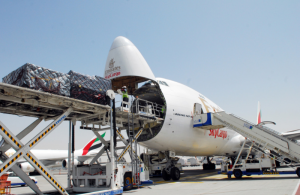 What are your short and long-term goals?
What are your short and long-term goals?
My priorities during this initial stage are to establish clear direction, continue to deliver first-class services to existing clients, provide leadership to employees, strengthen our relations with all existing and potential clients and manage our costs effectively.
My long-term goals are to grow our existing business and to secure new sustainable long-term business, improving financial results, add to our global presence, and finally perform at the highest level of industry standards. I also aim to provide a unique and highly competitive level of services by developing our exceptionally skilled, efficient, flexible and multi-skilled employees.
What is your next step in Emirates SkyCargo’s overall expansion and growth programme?
The planned move of our freighter operations from Dubai International Airport to Dubai World Central Al Maktoum International Airport is the next step in Emirates SkyCargo’ s overall expansion and growth programme. It provides us with a brand new facility for our freighter operations and will increase capacity and enable us to meet our long-term objectives.
While the site is being developed, it remains business as usual for us. We are working very closely with Dubai Airports to ensure a smooth transition of our freighter operations. The move does not include passenger fleet belly cargo operations which will continue to operate from Dubai International Airport.
The terminal will have an initial capacity to manage 700 000 tonnes of cargo per annum, which can be expanded to meet future growth. It also provides Emirates SkyCargo with the space to have a larger perishables handling area, with a dedicated pharmaceutical storage area, enabling it to expand its cool chain products and services.
In addition to the cargo terminal, various facilities and infrastructure will be built including 46 truck docks and 80 truck parking spaces, 12 aircraft stands directly in front of the terminal, while additional interface facilities – east and west cross docks will be built at Dubai International Airport.
In general, how strong is the air cargo market in the Middle East?
The Middle East cargo market is buoyant with on-going investment in expansion by regional players supporting the continued flow of cargo volumes both into and through the key markets in the Middle East. In the GCC the infrastructure developments continue to drive the need for materials and supporting logistics, this is particularly noticeable in the UAE, Saudi Arabia and Qatar. The continued expansion and development of airport facilities across the region is also driving growth, once again particularly in those countries mentioned, including Oman and Jordan as well as the long term opportunities that will be seen in Iraq. A thriving and growing consumer society with spare capital to invest and spend on luxury items as well as more standard consumable items, a growing tourist industry whose expenditure on perishable goods when staying at the growing number of hotels will continue to drive demand for food items being moved into the region by air. All signs point to on-going positive momentum for growth.
Plus, latest figures released by IATA show, Middle Eastern airlines are experiencing a continued robust expansion of demand with freight volumes growing by 12.7% year-on-year whereas globally airfreight demand has expanded only 1.2%.
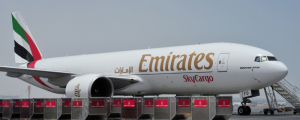 How has Emirates SkyCargo performed?
How has Emirates SkyCargo performed?
Defying the industry trend, the 2012-13 financial year has been a strong one for Emirates SkyCargo who for the first time reported a revenue over AED 10 billion reaching AED 10.3 billion (US$ 2.8 billion) mark, an 8 per cent increase over last year.
Emirates SkyCargo’s tonnage increased 16 per cent reaching a remarkable 2.1 million tonnes in a shrinking airfreight market, highlighting its ability to grow revenues against the industry norm. This year, freight yield per Freight TonneKilometre (FTKM) decreased by 6 per cent.
Contributing 15 per cent of Emirates’ total transport revenue Emirate SkyCargo continues to play an integral role in the company’s expanding operations.
At the end of the financial year, Emirates SkyCargo freighter fleet totalled 10 aircraft – eight on operating lease and two on wet lease.
Do you feel that emerging markets, particularly India and China are key to your growth strategy?
I believe the future lies in the growth potential of emerging markets such as India and China. For us, both countries remain strong areas of opportunities as we look to expand globally.
Both countries have tremendous potential for investors; India has the advantage of language whereas China has a
disciplined labour force.
Discuss some of the challenges the air cargo industry faces this year?
The international air cargo industry is struggling under the weight of a serious issue: overcapacity. Air freight has encountered severe headwinds as the eurozone fiscal crisis and middling economic recovery in the U.S. put pressure on demand for exports out of Asia, especially China. The exceptions, of course, are high-value products such as Apple iPhones and iPads that tend to create temporary spikes in volume and underpin the industry.
In addition, high fuel costs affect the bottom line of everything, and the impact on our industry cannot be overstated.
Do you feel 2013 is going to be a better year?
Prospects are encouraging for strengthened economies over the course of 2013 and 2014. As far as our industry is concerned, growth is expected to moderately strengthen in 2013, supporting the positive outlook for continued long-term world air cargo traffic growth.
For Dubai and Emirates SkyCargo the good news continues: we have seen incredible growth over the years and we anticipate the same going forward.
Twenty years ago, Air Cargo Update took a bold step to enter this niche industry publication. It was a remarkable journey of ups and downs as air cargo and its supply chain swung back and forth to the demands of the day punctuated by today’s unforeseen impact of the Coronavirus pandemic.
To mark our historic journey, we’ll bring you some of our best features from the past two decades, the movers and shakers with their insights and decisions that helped shape today’s air cargo industry.
More than a decade ago, IATA advocated for the gradual digitalization of the industry starting with the use of e-AWB.
In this edition, let’s look back at Shashi Panicker, Head of Cargo at Sharjah Aviation Services, as he discussed with ACU in 2012 the many benefits of the e-AWB and e- freight and why so many companies are struggling to adopt to the changes.
With e-Air Waybill (e-AWB) and e-freight deadlines looming over the air cargo industry, Air Cargo Update takes a look at the e-AWB and the status of its implementation across the globe and in the Middle East in particular. Shashi Panicker, Head of Cargo at Sharjah Aviation Services shared with us his views on the subject
In an effort to change the way aviation industry operates and improve the aviation and air cargo standards globally, the International Air Transport Association (IATA) has been advocating changes on various fronts through its simplifying the business programme. IATA is currently working within Global Air Cargo Advisory Group (GACAG) on e-commerce, security, customs and trade facilitation and sustainability.
The organisation is facilitating these collective cargo industry initiatives with the ultimate goal of bringing in sustainability to the sector.
In the current environment, the transportation of air cargo still involves a whole lot of paper documents. Therefore, IATA is focusing on the need for the air cargo sector to tackle e-freight; and rather than asking the industry to do all at once, the body has set deadlines to first achieve 100% implementation of e-AWB in a phased manner. The air waybill (AWB) is a key document in air cargo transport and an e-AWB is a first step towards creating a paperless environment.
Developed in collaboration with industry stakeholders, the e-AWB removes the requirement for paper AWB, which
significantly simplifies the air freight supply chain process.
The benefits of doing away with the large number of paper documents required for air cargo shipments as identified by industry stakeholders are: reduced paper use and need to print, handle and archive paper AWBs; simplified data entry and maintenance; reduced transfer times; and real-time access to bill date for all personnel. All these add up to bring about overall efficiency in the operations, and in the long term, result in significant cost savings for the air cargo and logistics sectors. In fact, IATA has estimated that this could translate into about US$4.9 billion of industry saving.
The challenge has been that countries worldwide have been slow in implementing e-commerce solutions. In the Middle
East, the implementation of e-freight and e-AWB has been much slower than anticipated. There is a need for various
stakeholders in the industry to come together to device a smart mechanism wherein a successful model can be drawn
up for the speedy implementation of the e-AWB.
Shashi Panicker, Head of Cargo at Sharjah Aviation Services enumerated the reasons for the slow rate of implementation of the e-AWB in the region.
In his view, the air cargo industry is relying heavily on paper documentation even today for a few reasons:
• The implementation of e-AWB and e-freight requires major investment in terms of time, technology and money
• Secondly the stakeholders are to agree the industry benefits and come forward with the required changes and investments, the world wants to comply.
On the benefits of e-AWBs, the Cargo Head said there were many benefits including reduced costs; higher productivity; better reliability; regulatory compliance; reduced cargo handling delays; paving the way towards e-freight; realtime access to AWB information; and elimination of the requirements to file paper AWB. When asked as to whether e-freight could be seen as a total solution, Panicker said, “e-freight can be a solution as it aims to take paper documents out of air cargo and replace it with the exchange of electronic data and messages that would lead to the following benefits: lower costs, faster supply chain transit times, greater accuracy, regulatory compliance, increased security, and it is better for the environment.”
“But, e-freight cannot replace paper documentation totally. Only 20 paper documents can be replaced with electronic
messages. The remaining documents are not in scope of e-freight, as they are not currently supported by international standards,” he continued.
With specific reference to Sharjah Aviation Services as well as the cargo carriers operating from Sharjah Airport, Panicker said they had not yet fully adopted the e-AWB, which are through FWB and FHL. “Implementation of the e-AWB is not an easy process and requires a whole system change which calls for investment, tremendous effort and coordination among various authorities and other stakeholders who are involved in the air cargo supply chain, to which we remain committed.”
In Panicker’s opinion, the major challenges in switching over to e-AWB in the Middle East are: (a) The ability of their customers to electronically transmit FWB and FHL through their system which are SITA enabled on SHJFFXH (b) The governing bodies to accept paperless transaction as the means of approval (b) System change, which requires the implementation of standardised electronic data interchange.
 The stakeholders involved in the air cargo supply chain are Shippers, Airlines, Forwarders and Ground Handlers. The airlines, he said, “have to take the lead to implement e-AWB with the forwarders; and forwarders should support airlines for e-AWB rollout by means of FWB and FHL messages to the handling company. To this end they have to trust EDI Agreement from the airline; own the responsibility to send FWB and FHL data; and cutover according to airline set target date.”
The stakeholders involved in the air cargo supply chain are Shippers, Airlines, Forwarders and Ground Handlers. The airlines, he said, “have to take the lead to implement e-AWB with the forwarders; and forwarders should support airlines for e-AWB rollout by means of FWB and FHL messages to the handling company. To this end they have to trust EDI Agreement from the airline; own the responsibility to send FWB and FHL data; and cutover according to airline set target date.”
“This of course improves the ground time while serving the customer,” said Bradley Boyd, Senior Cargo Operations
Manager, Sharjah Aviation Services, who believes is ground breaking for a traditional process which is long followed by the industry.
The Cargo Head stressed that it was important that the stakeholders cooperate and agree on the implementation
of the e-AWB. And how can they achieve that? “First the airlines, shippers and ground handlers should have a clear
understanding of the benefits in implementing e-AWB bills. Only then, all the stakeholders will have the same goal to effectively implement the e-AWB.”
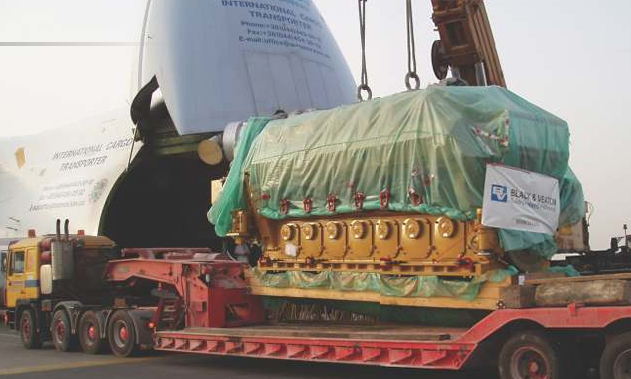 IATA has set the targets for airlines and freight forwarders with regard to e-AWB, with the aim of achieving 15% e-AWB implementation by 2012, 70% by 2013 and 100% by 2014.
IATA has set the targets for airlines and freight forwarders with regard to e-AWB, with the aim of achieving 15% e-AWB implementation by 2012, 70% by 2013 and 100% by 2014.
Did Panicker think this could be achieved in the Middle East or in the UAE within the set time frame? “Yes. As the leading airlines like Emirates SkyCargo have already taken the initiative in implementing e-AWB, it is not impossible for other airlines/ forwarders and ground handlers in the UAE to follow suit and achieve the full implementation of e-AWB,” he commented.
Positive developments
On the positive side, significant strides have been made by key players in some countries with regard to e-freight, which could induce more players to follow suit, going by the success rate of implementation of these initiatives by some key stakeholders.
Cathay Pacific Airways was one of the first airlines to switch to 100% e-AWB in Hong Kong, having removed paper AWBs totally from its Hong Kong International Airport hub in January 2011. Cathay Pacific introduced e-AWBs in Singapore and Malaysia in the first quarter of 2012.
Likewise, Hong Kong Air Cargo Terminals Ltd (Hactl) has also made a great deal of progress in e-freight initiatives, having completed the final phase of implementation of its fully e-freight-enabled COSAC-Plus cargo management system in April this year. All the 91 airline customers handled by Hactl have transferred smoothly onto the new system.
In the Middle East, Emirates SkyCargo has taken the lead role in spearheading the e-freight agenda regionally and
globally. In addition to eliminating paper air waybills in Dubai with the use of e-AWBs on all shipments out of its hub, the cargo carrier marked a milestone with its inaugural 100% paperless freighter flight between Nairobi and Amsterdam in April 2011. This indicates a significant step towards working in a completely electronic environment that will enhance operational efficiency to the supply chain. It is notable that 51 of the 111 cities Emirates SkyCargo serves are e-freight compliant.
In fact, the Dubai Customs have been very proactive in this area and are keen on electronic clearances. Within the Emirates Group there are several companies that have similar objectives. The ground handling agency dnata is doing a lot in this on the ground. Calogi, launched in Dubai mid-2008 to facilitate a comprehensive and integrated business environment for the air cargo supply chain community, has been one of the most successful trading platforms. Through this cost-effective portal designed for small-to-medium enterprises, freight forwarders can effectively do business with trading partners such as the cargo terminals, airlines and 3PLs.
Calogi allows people to trade in a seamless environment and has made Dubai (DXB) and Al Maktoum airports (DWC)
easier places to do business with.
There are several elements involved in the cargo transportation process where paper is required, and achieving 100 per cent e-freight is being dictated by various governmental clearance processes, with most of them still requiring a lot of paperwork.
Again, considering that many stakeholders and countries are involved in the supply chain and the border control
processes that come into play, one of the key requirements is the ratification of the Conventions. Unless the countries involved are in line with the agreements, it would be difficult for the stakeholders to go digital. If one country is on MP4 and the other has ratified MC99, it reverts back to 1928 Warsaw Convention which is a paper-based transaction and therefore a barrier to e-AWB. So the ratification of all these conventions is important for all cargo players.
The air cargo sector in the UAE is fortunate in that the country has ratified both MP4 and MC99. So they can transact with both parties, which is an advantage.
IATA is working with airlines, the national carriers and governments in an effort to achieve the set targets on time. Going by the current developments, in addition to many other global initiatives with regard to e-freight and e-AWBs, IATA’s vision of achieving 100% e-AWB for the complete cycle of the shipment on feasible lanes by end 2014 may well be realised.
Note: Air Cargo Update will be following closely the developments in the Middle East with regard to e-AWB and
e-freight to provide regular updates to our readers.
Twenty years ago, Air Cargo Update took a bold step to enter this niche industry publication. It was a remarkable journey of ups and downs as air cargo and its supply chain swung back and forth to the demands of the day punctuated by today’s unforeseen impact of the Coronavirus pandemic. To mark our historic journey, we’ll bring you some of our best features from the past two decades, the movers and shakers with their insights and decisions that helped shape today’s air cargo industry.
In this edition, let’s look back at our Q&A with Ram Menen, the Indian air cargo expert who helped establish Emirates SkyCargo from the ground up to a global powerhouse in the air cargo industry.
 Emirates SKYCARGO aims for greater global market share
Emirates SKYCARGO aims for greater global market share
Ram Menen, Divisional Senior Vice President of Emirates’ Cargo Division, shares his views on the remarkable growth in air freight business over the decades and how quickly the company has adapted to the needs of an evolving market to stay ahead of the game.
It takes more than just a brand name to flourish in today’s highly competitive global market place. Innovation and proper strategies lead the road to success.
Take Emirates SkyCargo, for instance. Unlike many airlines where cargo is seen as just supplement to commercial aviation business, for Emirates it is a well-run revenue spinner with promises for more growth.
And with an industry heavy-weight like Ram Menen at the helm, Emirates SkyCargo has been quick to adapt to the needs of the market and has differentiated itself from competition. Menen who has been with the company since the airline’s inception in October 1985 is currently the Divisional Senior Vice President of Emirates Cargo Division.
Described by his colleagues and friends as dynamic and open hearted, he is a man of many abilities. A face easily recognizable in the local media, thanks to his outgoing nature and capacity to grow beyond his professional duties, Menen is a public man and calls interpersonal skills his forte.
However, taking Emirates SkyCargo to where it is today has not been easy according to Menen who worked so hard to lead the company to greater heights with his deft management and interpersonal skills. And this is indeed proven by the company’s impressive growth figures.
This year, Emirates Group, mainly comprising Emirates Airline, Emirates SkyCargo and Dnata along with subsidiaries, announced a net profit of AED 5.9 billion (US$ 1.6 billion) – a 43 percent increase on last financial year’s figures, despite a challenging business climate.
Cargo revenue contributed 17.4 percent to the airline’s total transport, up by an impressive 27.6 percent compared to last year to a record AED 8.8 billion ($US2.4 billion). Cargo tonnage increased by 11.8 percent over the previous year to 1,767 thousand tons.
Keeping pace with evolution
The old saying ‘evolve or face extinction’ has never been truer.
Menen reminisced witnessing a complete transformation in the way the industry functions since his kick-off days. He believes that the revolutionary changes in the cargo industry began in the 1980s.
Since then, globalization, outsourcing and information technology have enabled many organizations to successfully operate solid collaborative supply networks. “The change really started in people’s mind set. They now have a better understanding of what the industry is all about. Earlier airlines and freight forwarders were two different entities. The Nineties has to its credit the awareness and realization of supply chain integration and that we are all partners in the same industry,” he explained.
 Thirty years later, the processes and technologies are still evolving. “Today, it is all about how quick and cost efficient a supply chain is. And technology to a great extent has driven this at an astounding pace,” he stated.
Thirty years later, the processes and technologies are still evolving. “Today, it is all about how quick and cost efficient a supply chain is. And technology to a great extent has driven this at an astounding pace,” he stated.
Truly, the ability to capture, migrate, integrate and facilitate the intelligent analysis of data is akin to the invention of fire. This is what will separate the companies who can walk upright from the ones that will be stuck in the tar pits of slow response. “The advent of the internet has made life more real-time and the interaction between various elements in the Supply Chain itself has become more integrated,” added the tech savvy Menen.
According to Menen, globalization and the proliferation of multi-national companies have also contributed to the development of supply chain networks.
Menen explained, “Globalization offers tremendous opportunities to companies of any size that can successfully provide or source products and services in dynamic markets. Today, whether or not a company produces or sources outside its home country, it is often competing against global organizations. And, to survive and thrive under these conditions, they need to develop efficient and effective global supply chains that can ensure a smooth supply of goods anywhere in the world.”
In addition, various aspects of the supply chain process such as procurement, production, manufacturing, inventory management, transportation, etc., have undergone a total concept change. For example, the manufacturing industries have now become ‘demand driven’.
Growth factors
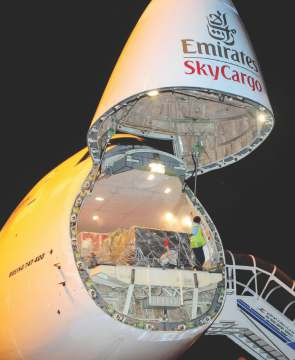 Basically, a lot of things worked in synergy to pick up cargo volumes. According to Menen, Emirates SkyCargo has achieved its success by a careful combination of latest technology, fleet composition and a global network covering over 113 destinations across 66 countries with multiple daily flights via Dubai to most destinations.
Basically, a lot of things worked in synergy to pick up cargo volumes. According to Menen, Emirates SkyCargo has achieved its success by a careful combination of latest technology, fleet composition and a global network covering over 113 destinations across 66 countries with multiple daily flights via Dubai to most destinations.
Technology such as end-to-end IT cargo management system Sky Chain, which gives customers a range of business logistics technology solutions, including up-to-the-second status reports on consignments, from booking through to final delivery is a key factor adding to its success.
Customer focus has also been a major factor. Menen believes it is important to get new customers each day. However, the majority of a company’s success is due to repeat business.
Undoubtedly, a company captures a larger market share by understanding its customers and providing them with a consistent positive experience. He endorsed this saying, “On-time and efficient dealing with customers is the mainstay of our business and we are only building on that.”
Plus, last year saw the airline increase its overall capacity available on its fleet in addition to continued route expansion and that has naturally drawn more business through us. In addition to serving all points on the Emirates passenger network, during the year, Emirates SkyCargo introduced four freighter-only destinations to Almaty, Bagram, Campinas and Erbil. “Growth of Dubai itself has also played a pivotal role in creating a large cargo market,” he noted.
Dubai & Emirates enjoy symbiotic growth
Menen acknowledged that Dubai and Emirates’ growth have been symbiotic where both have catalyzed one another’s growth. “You see, the relation is symbiotic where both Emirates and the world-class city of Dubai benefit each other. While Emirates has played an important role in creating a nexus between global transport and Dubai as a multi-modal hub, the growth of Dubai itself has also helped in creating a large cargo market.”
Truly, Dubai has undergone tremendous growth over the years. Today, it enjoys its favorable place as a significant player in international trading and transport logistics. This growth is a result of the Dubai government’s strategy in developing sectors that have been the key contributors to economic growth, including transport and logistics.
Dubai International handled 187,905 tons of international air freight in May this year. Annual freight traffic in 2010 was 2.27 million tons, compared to 1.93 million tons in 2009, an increase of 17.7 per cent.
The combination of rallying tourism and Dubai’s established role as a trading centre linking economies in the Far East, Europe, Africa and North America is also a key advantage for its aviation industry and economy.
The Emirate’s geocentric location is another plus allowing traffic to be easily routed either east-west or north-south.
“An estimated 5.8 billion passengers reside within an eight-hour flight time and Dubai is on the doorstep of two of the most dynamic markets in the world – India and China, which holds
great potential for us as for other air carriers in the region. And, Emirates Airline has largely been successful in tapping this opportunity,” said Menen.
In addition, the government’s support of businesses and efficient customs facilitation add to Dubai’s appeal as a prime transit and re-export hub, handling an average of 70 per cent of air cargo in the Middle East per year.
This dominance is expected to continue, as the International Air Transport Association (IATA) forecasts that the UAE will be the sixth largest in the world in terms of international freight, with a projected 2.75 million tons handled by 2014 and Dubai will play a central role in this growth.
However, Dubai’s success is exemplified by the efficiency of Emirates’ operations. Emirates’ profits have been sufficient to pay for all the investment in its fleet and repay its loans over the past decade. Moreover, contrary to the widely held belief, Emirates does not receive government support through subsidies or other financial interventions, but has in fact paid out annual dividends to the government of Dubai totaling US$1.6 billion since 2002.
Challenges
Though 2010 was a good year for the company, it had to deal with some obvious problems to see itself permanently in green. Considering the unstable political climate and business environment in the second half of 2010, the carrier was able to able to swiftly adjust flight schedules, redeploying aircraft to balance the network and optimize revenue.
“Security also has been a primary concern for us. As a truly global and major stakeholder in the airfreight market Emirates SkyCargo is proactively working to see how our experience can positively contribute towards making airfreight movements safer today and in future,” said Menen. “Suffice to say; in this regard we are fully compliant with global screening and reporting protocols with regards to moving freight.”
“Besides, environmental policies also add to our costs,” he added. “The biggest challenge however remains to be high fuel prices,” he admitted. The first four months of the year had seen $280m added to the carrier’s fuel bill.”
Crafting success
“Nevertheless, despite challenges we have been able to achieve ambitious expansion and growth plans coupled with excellent customer services and high profits,” Menen noted.
With plans to increase the number of routes it serves, Emirates is looking to schedule more flights to destinations in North and South America, Australia and Asia. South Asia is a potential market for Emirates – Menen believes, the future lies in the growth potential of emerging markets such as India and China.
“We will see a shift into the consumer markets of India and China, which are strengthening with a new set of consumers who are young with a disposable income. India has tremendous potential for investors and excels in certain sectors such as IT. India has the advantage of language whereas China has a more disciplined labor force. It will be competitive between the two countries but liberalized trade agreements may change future dynamics,” he said.
In 2011-12, Emirates expects delivery of 21 new aircraft, including six A380s, 13 Boeing 777s and two Boeing 777F freighters. Since 1 April 2011, Emirates has received one Boeing 777 bringing its current fleet as of May 2011 to 153 aircraft, including eight freighters.
This will in turn grease Emirates SkyCargo’s global ambitions as it uses belly-hold capacity in Emirates’ 145 passenger aircraft as well as main deck capacity on its fleet of eight freighters, featuring three Boeing 747-400Fs, two 777Fs, two 747-400ERFs and one 747-400SF. However, these expansion plans will have to be measured against market conditions, with the aviation industry particularly susceptible to fluctuations in fuel prices and economic sentiment.
Ajay Singh wears many hats but he is probably best known in India as the man who founded the low-cost carrier SpiceJet in 2005. Sold it and successfully revived from near closure in 2014, taking over from the buyer when the company was buried in mountains of debts.
“I did not take over SpiceJet, when it was on the verge of a shutdown two years ago, to become rich. I did that as I had an emotional connect with the employees and the company, which I founded in 2005,” Singh was quoted in the Indian media as saying.
Today, SpiceJet is debt-free and is considered as India’s third largest private airline with about 200 aircraft. Its stock was up 124 percent in 2017 and has gained more than 800 percent since its near-demise in December 2014 with market value of US$1.2 billion.
And Singh is credited for the airline’s dramatic turnaround and expansion overseas.
SpiceJet currently flies 10 times a week to Dubai from several key cities in India. The airline plans to add more flights once India and the UAE sign new bilateral air agreements allowing more slots for Indian carriers to serve the route.
Well exposed and experienced in business even at an early age, Singh was raised in a family that successfully dabbled in real estate and fashion accessories business in India where the majority of the population are women.
His ability to resurrect a company from near death has been noticed early on when he successfully brought to profits the Delhi Transport Corporation in 1996. Back then, the company had only 300 buses and within two years, Singh grew it to 6,000 buses with good revenues.
As a student, Singh was into crickets and hockey, even playing as a captain for his cricket team at St. Columba’s School in New Delhi.
After finishing his engineering degree in New Delhi, he went to the United States where he took up his MBA in Finance at Cornell University.
He initially joined his family’s business before setting his sights in India’s private sector.
The aviation billionaire said he doesn’t have much free time with his many responsibilities at SpiceJet and his other businesses but when he does, he likes to spend it with his family, the simple things in life and his new advocacy—promoting boxing in India.
“I don’t have that much free time,” he told Air Cargo Update in an interview on the sidelines of Aviation Show MENASA held in Dubai where he was among the panelists. “When I do get free time, I watch movies. I listen to music and watch a lot of sports.”
“I have two wonderful daughters and I like to spend time with them. One is studying in the US and the other is just one-year-old,” he added.
As President of the Boxing Federation of India, Singh said he devotes time to promote the sport among Indians saying the country needs to professionalize boxing.
Among his priorities is to provide boxers with the best training, coaches and technical officials as well as improve infrastructure related to the sport.
“We will try to win a lot of medals in boxing in the coming Olympics,” said Singh who is bent on winning no matter what the battle is.
In less than a decade, the company has firmly established a foothold in the highly competitive air cargo industry, increasing its freighter fleet from 4 to 7
The global air cargo industry grew by 3.8 percent in 2016 but it remains exceptionally challenged with issues on over capacity, security, political instability and a slowdown on world trade.
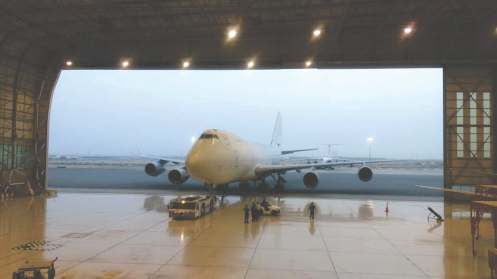 The International Air Transport Association (IATA) says strong growth was reported on cross bordere- commerce and pharmaceuticals, which could continue to offer opportunities for the air freight industry in 2017 and beyond.
The International Air Transport Association (IATA) says strong growth was reported on cross bordere- commerce and pharmaceuticals, which could continue to offer opportunities for the air freight industry in 2017 and beyond.
“Looking ahead it remains unclear as to whether the recent momentum for air cargo is a start of a sustained, stronger growth trend or a potential false dawn. There are a number of competing drivers. On the one hand, the industry is reporting strong growth in areas such as cross border commerce and pharmaceuticals, which are expected to continue to offer opportunities for air freight in 2017 and beyond,” IATA says in its December 2016 market analysis.
“On the other hand, though, wider weakness in world trade conditions remains an ongoing concern. Moreover, the recent pick-up in populist and protectionist political rhetoric means that we may now have passed ‘peak trade openness’, which is likely to reduce tailwinds for global trade and air cargo in the years ahead,” it added.
Industry experts say the first quarter of 2017 brought in promising figures for a sustained upward trend. And the nonprofit group IATA is also optimistic the air freight sector will post at least a 5.5 percent growth this year with the e-commerce boom.
Rising above the challenges
But for some companies like Global Services Solution FZCO (GSS Aero), tough times are no barrier to rake in profits and propel growth where oppor-tunities are likely to be made. The company, which specializes in ACMI and charter flights out of its hub in the UAE, consistently posted 20-25 percent growth for three consecutive years now ending in 2016.
 “We had been growing consistently in the last three years at an average 20-25% and in 2016, we performed exceptionally well with sales
“We had been growing consistently in the last three years at an average 20-25% and in 2016, we performed exceptionally well with sales
turnover of AED142 million,” Shekar Gunasekaran, founder and CEO of GSS Aero, told Air Cargo Update. The company also expanded its
services this year with the launch of the VIP passenger charter department.
“This year, we started our VIP passenger charter department to cater to our regular customers. Despite stiff competition from wellestablished players in the market, it’s showing good results less than a year since being introduced,”
Gunasekaran shared and expressed optimism that with the core strength of the company’s staff coupled with his partners’ support, the venture will also be successful.
Building capacities and reputation
Though relatively new in the market, GSS is run by well-experienced industry proffessional whose collective ideas and strategies make
a difference.
Add to that is the company’s huge investments on assets that speed up the freight process and ensure unmatched reliance on delivering
goods on time, practically anywhere in the world.
Gunasekharan said with acquisition of three more planes, their fleet would be beefed to seven freighters.
“We are an asset-based company. We currently own four freighters in our fleet and will add another three planes this year to our growing fleet to cater to the growing charter market in the region. In addition, we also have long-term contracts with various customers that allow us to operate our freighters extensively in the region to cater to South Asia/Iraq/ Somalia and African market on a regular basis depending on customer’s flexibility,” he said.
For the most part, GSS is known for ACMI and charter brokering, a highly-competitive specialization in the air cargo industry with only the
most stable companies managing to survive.
Gunasekaran agreed saying he has seen a number of companies charter brokers declined, preferring those on with known reliance
professionalism as clients.
Apart from GSS’s growing assets, it also has well-trained and highly professional staff who can deal with clients any time of the day to solve problems.
“ We also specialize in crews management, in-house 24 x 7 flight operation team, direct contract with fuel suppliers, engineering support
and own AOC,” said Gunasekaran.
GSS clients include some of the biggest and well-reputed in global trade such as Rus Aviation, Chapman Freeborn, WFP, KTZ Express, SFS,
Fast Logistics, Flying Carpet, UPS, Kuehne Nagel, among others.
“These customers are with us for several years and contribute to our growing success” said Gunasekaran.
To date, GSS has 23 staff in the UAE; two in Houston, and; 11 in Moldova. All of whom are extended appropriate trainings to keep up with
the needs of the industry.
Gunasekaran said their staff work as a team are continuously encouraged to learn new things for their professional benefits.
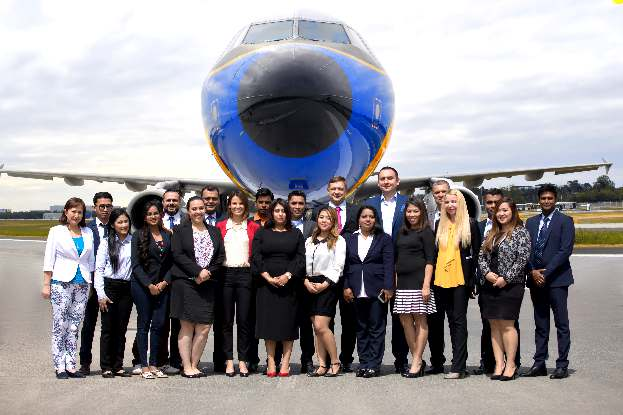 “We believe in our staff strength and consistently encourage them to elevate to next level within the organization and provide support /
“We believe in our staff strength and consistently encourage them to elevate to next level within the organization and provide support /
encourage-ment to them in professional and personal level,” he said.
Vision 2017 and beyond With solid financial footing and an astute management, GSS is now embarking on overseas expansion plans, to further widen its international presence among potential clients. It is also buying three more B747 freighter planes. On top of that, the company has just opened its new office in Houston, Texas and is now on the final stage of setting up similar offices in Hong Kong and Europe.
“Year 2017 is very important in the history of GSS since we have already opened office in Houston, USA and in addition, we will be taking delivery of our first B747-400F freighter followed by 2nd and 3rd aircraft in the month of Sept and Oct 2017. We are also in the final stage to open office in Hong Kong and have European AOC,” said Gunasekaran.
A well-reputed executive in the industry, Gunasekaran says his vision is to make GSS a global brand known for its one stop cargo
services.
“We have strong presence in the
UAE market and would like to brand our company as one stop destination for all charter requirements since our company is unique because of the wealth of experience our directors have in all fields of sales, operations, engineering, aircraft management, ground handling and flight support service. In the coming years, we would like our company’s presence felt in Far East, Europe,the Middle East and to a great
extent in North & South America,” the GSS founder & CEO said.
And like others, Gunasekaran is also upbeat about Dubai hosting the World Expo 2020. The event is largely seen to fuel economic activities in many fronts, including aviation and logistics.
“It’s very important not only to our industry but in totality since this automatically increases the volume of logistical business in coming years and have positive impact in our charter department to import some urgent project cargo to UAE from various part of the world,” he said. “We expect the cargo industry to see substantial growth in light of Expo 2020.”
About Shekar Gunasekaran
Steering the wheel for GSS Aero is the pragmatic and enterprising Shekar Gunasekaran, the company’s founder and chief executive officer.
Born and raised in eastern India’s Chennai, the physics graduate Gunasekaran began his career in the aviation industry in 1990 with the
Pakistan International Airlines. He later joined Russia’s Aeroflot, where for the most part, he dealt with charter flights for large pharmaceutical companies transporting goods to Russia and CIS.
In 2003, Shekar relocated to Dubai to join Hellmann Worldwide Logistics where he made a name for himself by “winning big contracts.” This dramatically changed his reputation in the industry such that by 2009, he managed to set up GSS.
By 2012, GSS acquired its first aircraft. Today, its fleet will soon be made up of seven freighters with the acquisition
of three more B747 this year.